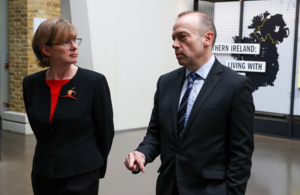RECORDS related to the Troubles in Northern Ireland will be made available to all under a new project funded by the British Government.
Government files from the period, which saw years of violence and civil unrest blight the North, will be made virtually available to the public for free through a new digitisation project announced this week.
Northern Ireland Secretary Chirs Heaton-Harris has confirmed a £5million legacy memorialisation fund as well as the digitisation project, which are designed to support recommendations made for a memorialisation strategy to be commissioned as part of the controversial Troubles Legacy Bill, which is currently progressing through Parliament.
Mr Heaton-Harris made the announcement after visiting the recently opened ‘Northern Ireland: Living with the Troubles exhibition’ at the Imperial War Museum in London.
“It was my privilege to visit the Imperial War Museum’s exhibition on the Northern Ireland Troubles,” he said.
“Showcasing new artefacts and oral histories, this moving exhibition is an excellent example of how we can remember and learn from the events of the past in an inclusive way through multiple experiences,” he added.
“I’m therefore delighted that the UK Government has committed £5million to support the recommendations of the memorialisation strategy that will be commissioned through the Government’s Legacy Bill.”
The planned digitisation project will make Troubles-related records held at The National Archives “more readily available to all, virtually and free of charge, the government has confirmed.
The first phase of this will be the launch of a new web portal bringing together in one place government files which are focused on the Troubles in Northern Ireland from 1994 up to and including the signing of the Good Friday Agreement in 1998.
“I welcome the launch of this online initiative which demonstrates the Government’s commitment to making accessible as much information as possible about an important period of Northern Ireland’s complex history,” Mr Heaton-Harris said.
“By encouraging reflection and consideration of our Troubled past, we can hopefully recognise the progress made since the signing of the Belfast (Good Friday) Agreement and towards a shared and more prosperous future.”
The government’s planned memorialisation strategy aims to “identify, and fund, inclusive new structures and initiatives to remember those who were lost during the conflict, and help ensure that the terrible events of the past can never be allowed to happen again”, they claim.
 NI Secretary Chris Heaton-Harris announced the plans this week following a visit to the Northern Ireland: Living with the Troubles exhibition at the Imperial War Museum in London
NI Secretary Chris Heaton-Harris announced the plans this week following a visit to the Northern Ireland: Living with the Troubles exhibition at the Imperial War Museum in LondonHowever, critics of the Troubles Bill continue to slam the intended law as “fundamentally flawed” as it seeks to limit prosecutions for crimes committed in Northern Ireland during the Troubles period.
The suggested law offers conditional immunity for those who cooperate with a proposed Independent Commission for Reconciliation and Information Recovery (ICRIR).
It was formally introduced into the House of Commons on May 16, 2022, where the Bill passed on July 4, 2022.
As of January 24, it was back in the House of Lords for its Committee stage hearing, which concluded on May 11.
The legislation is now at the Report Stage, with Lord Caine making amendments to the proposed law before it returns to the House of Lords later this month.

